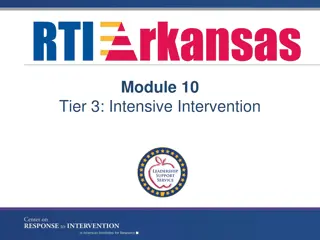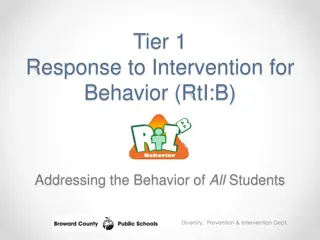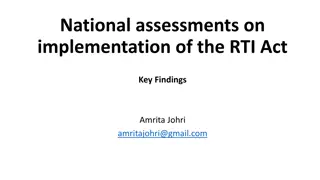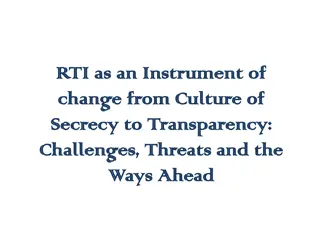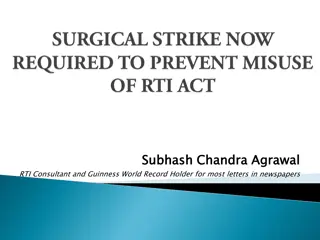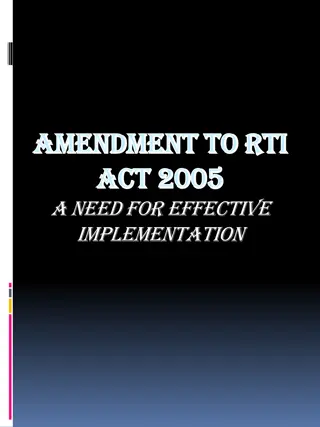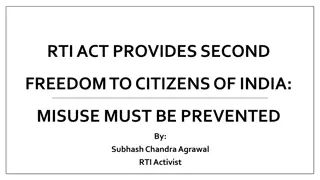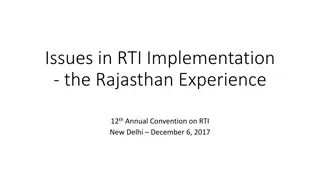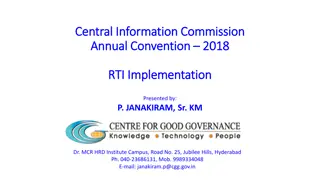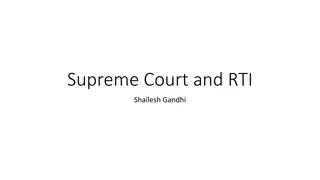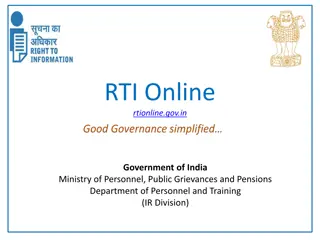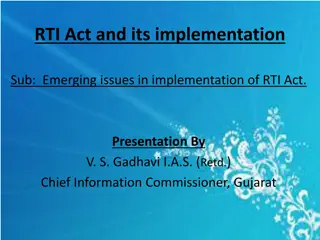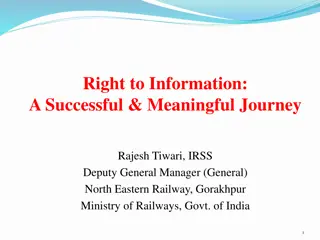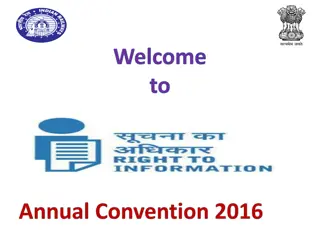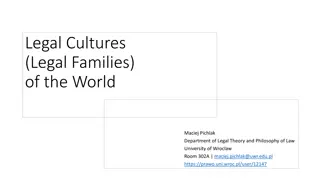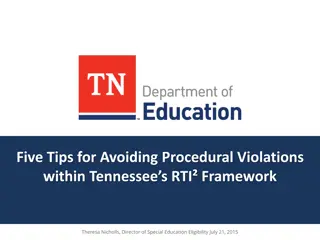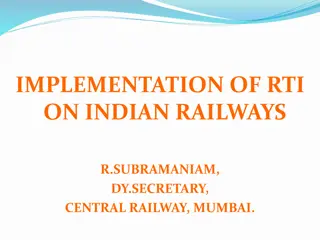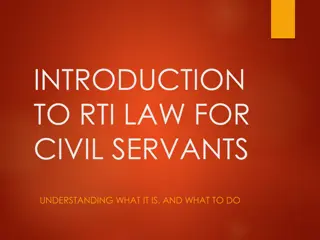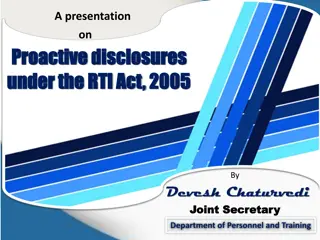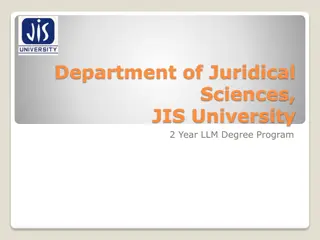Konw about our team
Know About Our Team:\nMr.Bageerathan\nMr. Bageerathan is a distinguished legal professional with a rich background spanning over 16 years in the legal field. He earned his Law degree from University Law College and further enhanced his legal acumen by obtaining Dual Masters degrees in Law (LL.M) fro
0 views • 4 slides
Understanding Tier 3 Intensive Intervention in RTI Systems
This content delves into the critical features of Tier 3 interventions within Response to Intervention (RTI) frameworks. It covers the objectives of Tier 3 systems, designing and implementing interventions, problem-solving processes, essential components of RTI, evidence standards for interventions,
0 views • 64 slides
Austin's Theory of Law by Rinkey Sharma: An Overview
Austin's Theory of Law, presented by Rinkey Sharma, delves into the Imperative Theory of Law as proposed by Austin, known as the father of English jurisprudence. It explores General and Particular Jurisprudence, Austin's definition of law, and the elements of positive law, emphasizing the concepts o
0 views • 11 slides
Defending the Right to Information: The Sri Lankan Experience
The Sri Lankan experience in defending the right to information involves sensitizing citizens and journalists prior to enactment, influencing key decisions during enactment, publicizing the use of RTI post-enactment, and learning valuable lessons such as resetting power imbalances and the importance
0 views • 7 slides
Understanding Gas Laws: Boyle's, Charles', Gay-Lussac's, and Avogadro's Laws
Gas laws such as Boyle's Law, Charles' Law, Gay-Lussac's Law, and Avogadro's Law govern the behavior of gases under different conditions. Boyle's Law relates pressure and volume at constant temperature, Charles' Law relates volume and temperature at constant pressure, Gay-Lussac's Law relates pressu
1 views • 19 slides
Effective Discipline Procedures and Strategies in RtI:B Implementation
This content focuses on RtI:B Tier 1 strategies to address the behavior of all students, emphasizing effective discipline procedures, team collaboration, data analysis, and faculty commitment. It delves into critical elements including developing responses to problem behavior and using various sourc
1 views • 44 slides
Evolution of Trust Law in Malta
Malta, with a unique legal system integrating civil and common law concepts, has evolved its trust law over the years. The concept of trust was gradually adopted, culminating in full integration into domestic law post-2004. Recent amendments have further solidified the legal framework, bridging the
4 views • 150 slides
Understanding Right to Information and its Implementation in Vanuatu
The session on Right to Information (RTI) aims to enlighten participants on access to information, its importance in community participation, and the process of obtaining information. Vanuatu's commitment to RTI is evident through the National RTI Policy and Act, aligning with global conventions for
0 views • 32 slides
Understanding the Rule of Law and Legal Systems in Wales and England
The content discusses the nature of law, the Welsh and English legal systems, and the Rule of Law doctrine. It includes observations from the 2019 AS Law Unit 1 examination, emphasizing the importance of adhering to rubrics and answering questions clearly. Candidates faced challenges with timing and
0 views • 14 slides
National Assessments on Implementation of the RTI Act: Key Findings
The report highlights key issues in the implementation of the Right to Information (RTI) Act in India, including growing delays in Information Commissions, poor proactive disclosures, and lack of accountability. It reveals the estimated time for a new appeal/complaint to be heard by the Information
0 views • 6 slides
Impact of Right to Information Act on Transparency and Accountability: Challenges and the Way Forward
The Right to Information Act is a crucial tool in transforming the culture of secrecy to transparency. It aims to promote accountability, eradicate corruption, and empower citizens. However, the implementation of RTI faces challenges such as lack of proactive thinking in bureaucracy and infrastructu
11 views • 15 slides
Contrasting Legal Systems Around the World
Explore the diverse legal families globally, such as Civil Law (Romano-Germanic) and Common Law (Anglo-American), along with their historical backgrounds, sources of law, and dominant ideologies. Delve into the distinctions between Civil Law and Common Law, their origins, development, and practical
0 views • 17 slides
Insights into the Indian RTI Act and Proposed Amendments
Subhash Chandra Agrawal, a renowned writer and Guinness World Record holder, sheds light on the Indian Right to Information (RTI) Act of 2005. He discusses the Act's significance in promoting transparency and democracy, highlighting proposed amendments that could impact the autonomy of Information C
0 views • 18 slides
Challenges and Solutions in Preventing Misuse of the RTI Act in India
Over the years, the RTI Act in India has faced challenges due to misuses by individuals for personal gains. Efforts to prevent such misuse through training, Supreme Court verdicts, and CVC circulars have been observed. The need for regular modifications and refinements to address misuse and maintain
0 views • 11 slides
Understanding General Criminal Law: Principles and Relationships
General Criminal Law encompasses rules governing offenses and their penalties, exploring the definitions of offenses, relationships with social sciences, other branches of law, and auxiliary sciences. This presentation covers the importance, sources, and branches of criminal law, highlighting its in
1 views • 230 slides
Strengthening the Implementation of RTI Act 2005: Areas for Improvement
The amendment to the RTI Act 2005 seeks to enhance its effectiveness by focusing on areas like maintenance of public records, proper utilization of resources, and ensuring accountability. Suggestions include introducing procedures for record preservation, scanning documents, and using both soft and
0 views • 13 slides
RTI Act: Empowering Indian Citizens and Ensuring Accountability
The Right to Information (RTI) Act in India has provided citizens with a powerful tool to expose corruption and promote transparency in governance. This Act has led to significant reforms and discussions on issues such as judicial accountability and political party transparency. Efforts are needed t
0 views • 9 slides
Understanding Combined Gas Law and Ideal Gas Law for Final Exam Preparation
Explore the concepts of Combined Gas Law, Boyle's Law, Charles's Law, Gay-Lussac's Law, and their reflection in the Ideal Gas Law. Learn how to solve problems using these laws, prepare for your final exam scheduled for Tuesday, December 12 at 12:30 in the specified room. Dive into in-class practice
1 views • 23 slides
Challenges in RTI Implementation: Rajasthan's Perspective
Rajasthan faces various challenges in the implementation of the Right to Information Act, 2005. Issues include gaps in suo-moto disclosure, faulty records management, and resource crunch manifestations. These challenges hinder the effective functioning of the RTI machinery in the state, impacting tr
2 views • 16 slides
Overview of UK Law: Statute Law, Common Law, Criminal Law, Civil Law
Statute Law is written law created through the parliamentary process, forming the basis of the legal system. Common Law, on the other hand, is unwritten law based on judicial decisions and precedents. They govern different aspects such as civil and criminal matters, each with its unique characterist
0 views • 15 slides
Successful Implementation of Right to Information: Key Factors and Observations
Effective implementation of the Right to Information (RTI) depends on various stakeholders' competencies at different levels, including government authorities, civil society organizations, and applicants. When RTI is successfully implemented, information is freely available, public authorities are t
0 views • 18 slides
Overview of RTI Act and Key Legal Cases
The content discusses the Constitutional position of the Right to Information (RTI) Act in India, highlighting Article 19 and Section 7(1) of the RTI Act. It also delves into significant legal cases such as CBSE vs. Aditya Bandopadhyay and Girish Ramchandra Deshpande vs. CIC, emphasizing the balance
0 views • 9 slides
Understanding the Right to Information (RTI) Act in India
The Right to Information (RTI) Act in India empowers citizens to seek information from public authorities, promoting transparency and accountability in governance. This process involves writing a request letter, paying RTI fees, and following specific procedures for filing and appealing RTI requests
0 views • 28 slides
Challenges and Recommendations for Effective Implementation of RTI Act in India
Emerging issues in the implementation of the RTI Act include the inadequate staffing of information commissions, non-compliance with orders, and lack of attention from higher authorities. The challenges also extend to training, proactive disclosure, and legal issues. Recommendations are put forth to
0 views • 8 slides
Understanding Response to Intervention (RtI) for Effective School Support
Response to Intervention (RtI) is an evidence-based model in education that integrates academic and behavioral instruction and intervention to support students at different levels. It aims to prevent issues, intervene early, and promote student success. RtI involves all students in the school, with
0 views • 10 slides
International Law Programs 2021: E-Castle Updates and Course Offerings
Explore the online programs offered by the International Law Programs in 2021 at the E-Castle. Discover the benefits, courses available, program dates, instructor insights, and more. From International Business Law to Public International Law, gain valuable knowledge and networking opportunities in
0 views • 21 slides
Enhancing Transparency and Accountability in North Eastern Railway through Right to Information
The journey of Rajesh Tiwari, Deputy General Manager of North Eastern Railway, highlights the significance of Right to Information (RTI) in ensuring quality railway services. With over 55,000 employees and numerous stakeholders, RTI plays a crucial role in promoting transparency and fair practices i
0 views • 12 slides
Importance of Right to Information (RTI) Act in Governance
The Right to Information (RTI) Act of 2005 in India has been a crucial tool in enhancing transparency, accountability, and citizen participation in governance. It empowers the public to engage with their representatives and government, combat corruption, ensure good governance, and promote public ac
0 views • 26 slides
Right to Information (RTI) Implementation at REIL Jaipur
The presentation covers the implementation of the Right to Information (RTI) Act at Rajasthan Electronics & Instruments Limited (REIL) in Jaipur. It highlights the significance of transparency, accountability, and good governance in the organization, providing information on the practical regime of
0 views • 14 slides
The Continuing Relevance of English Law to Irish Corporate Law Reform
English Law remains relevant in Irish corporate law reform, impacting areas like takeover regulation, deferred prosecution agreements, schemes of arrangement, and the comply or explain approach. The influence of English law is seen where there is no EU law dimension or when EU legislation allows mem
0 views • 10 slides
Study on Transparency Law (RTI) at Grass-roots Level in Bihar and Rajasthan
This report delves into the role of Transparency Law (RTI) in enhancing democracy through public participation at the grassroots level in Bihar and Rajasthan, focusing on the comparative analysis of its implementation in villages and blocks. It aims to explore how RTI connects people to the governme
0 views • 17 slides
Classification of Law: Understanding Different Types and Functions
Exploring the classification of law is essential for understanding the diverse nature of legal systems. This overview delves into domestic law vs. public international law, public law vs. private law, and the sub-divisions within public law, such as constitutional, administrative, and criminal law.
0 views • 19 slides
Overview of Legal Systems and Roman Law Development
Legal systems play a crucial role in governing societies, with Roman Law, Common Law, Civil Law, and Religious Law being some of the major types worldwide. Roman Law, focusing on private law, has influenced legal traditions in various regions, especially in Europe. Contrasting Common Law and Civil L
0 views • 26 slides
Comparative Analysis of Legal Families Around the World
Explore the diverse legal cultures and families existing globally, including Civil Law, Common Law, Far East, Islamic, Hindu, and more. Learn about the historical background, methods of reasoning, institutions, sources of law, and dominant ideologies that characterize each legal family. Delve into t
0 views • 17 slides
Avoiding Procedural Violations in Tennessee's RTI Framework
Gain valuable insights on avoiding procedural violations within Tennessee's Response to Intervention (RTI) framework through the guidance provided by Theresa Nicholls, Director of Special Education Eligibility. Learn about the risks associated with procedural violations, review pertinent case law, r
0 views • 29 slides
Implementation of RTI on Indian Railways Research Findings
Research led by R. Subramaniam, Dy. Secretary at Central Railway, Mumbai, studied the implementation of RTI on Indian Railways. The study involved senior Railway Officers from various departments, using a questionnaire as a data collection method. Findings include insights on the impact of RTI on wo
0 views • 30 slides
Understanding RTI Law and Freedom of Information in Vanuatu
This content provides insights into the importance of RTI law for civil servants, emphasizing transparency and accountability. It covers the objectives of the course, the concept of freedom of information, the necessity of such laws in Vanuatu, and the benefits of openness in governance. The focus i
0 views • 68 slides
Understanding Disclosures under the RTI Act
Exploring the evolution of disclosures under the RTI Act of 2005, this presentation outlines the shift from the Pre-RTI regime of holding onto information to the Post-RTI regime of proactive disclosures. It delves into legal provisions mandating Public Authorities to maintain transparency through Se
0 views • 14 slides
2-Year LLM Degree Program in Juridical Sciences at JIS University
Explore the 2-year LLM degree program offered by the Department of Juridical Sciences at JIS University, specializing in Corporate Law, Criminal Law, and Constitutional Law. The program covers a range of specializations such as Comparative Criminal Law, Human Rights, Corporate Law, Competition Law,
0 views • 7 slides
Transparency and Efficiency in Handling RTI Requests: Case Studies and Growth Analysis
Explore the effective handling of RTI requests, analysis of growth trends, and case studies demonstrating transparency and responsiveness to communication. Uncover insights on the percentage of appeals, mistakes corrected through RTI requests, railway recruitment case studies, and refund case resolu
0 views • 12 slides

